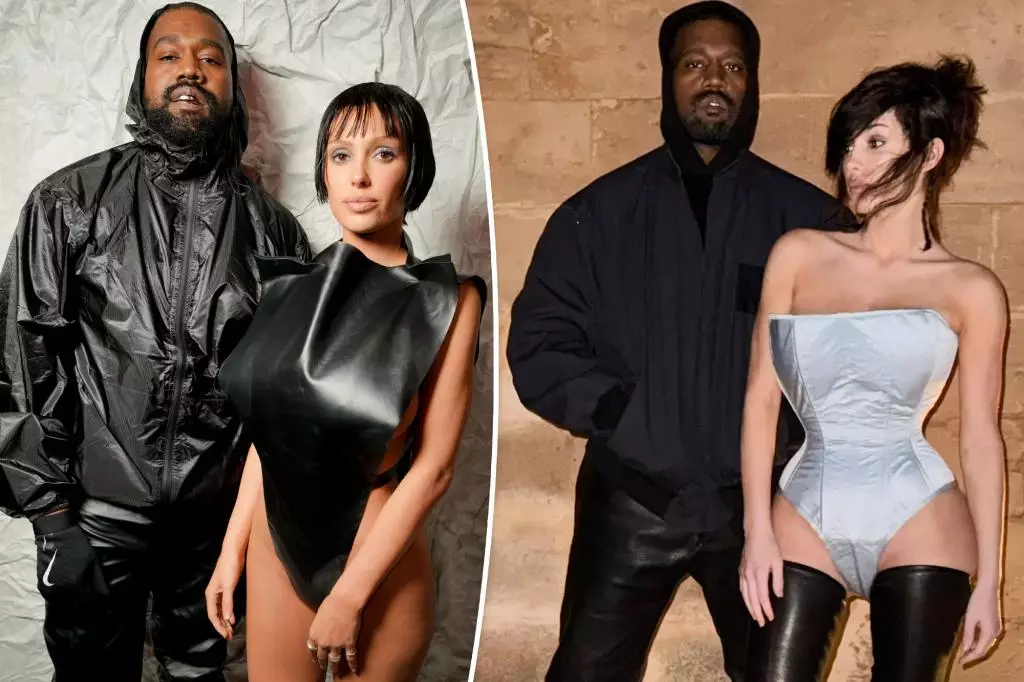Kanye West’s recent proclamations about his relationship with Bianca Censori delve into the murky waters of love and power dynamics. With statements that suggest he views himself as Censori’s “master,” the boundaries of their relationship become questionable. The societal implications of West’s comments are striking, especially considering the historical conversations around gender roles and autonomy in relationships. His public endorsement of a fan’s assertion that Censori is a “subservient extension” raises profound concerns about how we define partnership and power in romantic relationships.
At a glance, one could interpret West’s comments as vigorous affirmations of his love and the dynamics he believes exist between him and his wife. Still, intertwining power motifs with personal relationships all too often leads to a problematic dialogue. Censori is portrayed as someone who simply conforms to her husband’s desires without regard for her own agency. This perception both trivializes her identity and raises alarms regarding gender dynamics in their union, suggesting a traditional model where dominance has no place in modern consciousness.
Clothing Choices as a Reflection of Control
Censori’s fashion choices have become a flashpoint in this discussion. Her bold appearances, especially the sheer dress she donned at a prominent red-carpet event, have been directly linked to West’s influence. He openly admitted to having “dominion” over Censori, illustrating an alarming acknowledgment of authority that should ideally not exist in a healthy partnership. The stark statement, “she definitely wouldn’t have been able to do it without my approval,” leaves one wondering whether her self-expression is truly hers or a reflection of his will. This disparity raises not only ethical considerations but also questions about autonomy in an artistic context.
Amidst heavy criticism, West’s representative attempted to downplay accusations of control, suggesting that Censori is the “guiding creative intelligence” behind her style choices. Yet, this re-framing does little to absolve the narrative he projects. If she is indeed strong enough to express herself, where does that leave West’s boasts of authority? Are his proclamations highlighting a pervasive issue of micro-controlling behavior masquerading as affection in public life?
The Rocky Road to Reconciliation
The couple’s journey has been punctuated by public reconciliations and tensions. Following Kanye’s chaotic behavior and controversial statements about celebrities’ children, their relationship hit a rough patch, with Censori reportedly leaving him due to concerns for his mental health and public discourse. In his recent music, he alludes to these challenges, painting a portrait of longing and confusion: “My baby, she ran away.” As listeners, it’s difficult not to empathize with him during these vulnerable moments, but one must also question the nature of the hardship he shares.
The abrupt shifts in their relationship status—seen dining out in Spain following a tumultuous period—highlight the dichotomy that often exists in celebrity relationships. Is this a testament to unconditional love, or is it reflective of a toxic cycle? Public scrutiny complicates matters further, as fans and followers engage in a collective dialogue about relationship norms, expectations, and human flaws. Yet, amidst these complexities, the real conversation should be about the implications of glossing over problematic behaviors in favor of celebrity intrigue.
The Persistent Echoes of Celebrity Culture
With each move and utterance, West and Censori encapsulate the paradox of modern celebrity culture—one that glorifies individuality while often shrouding interpersonal relationships in unhealthy dynamics. Their lives play out like a reality show, contrasting the significance of personal agency against the backdrop of power plays. One cannot help but wonder what the public’s fascination says about our cultural obsession with power instead of partnership.
Public figures such as West can inadvertently feed stereotypes and dynamics that perpetuate detrimental beliefs about gender relations. In a world where love should encourage growth, creativity, and mutual respect, the example they set seems constructive only on the surface. A deeper analysis exposes troubling traits that could resonate with a broader audience than intended. While we celebrate love in its many forms, the dynamics at play in West and Censori’s relationship prompt us to delve deeper into the true nature of their connection beyond the glitzy image presented.

